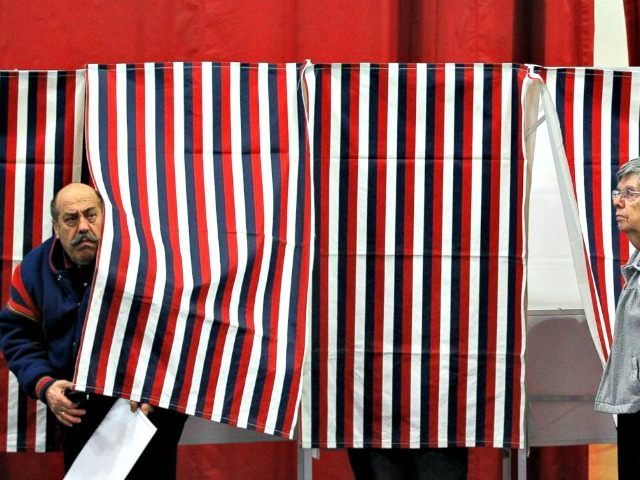According to all recent polling, Donald Trump enjoys a big lead in New Hampshire’s Republican race, with four or five other candidates battling for place and show.
But voters in New Hampshire, like Iowa, are famous for putting off their final voting decision until the very end.
In both 2008 and 2012, around 20 percent of New Hampshire Republican primary voters decided on election day which candidate to support. Including the weekend before the primary election, that number increases to 40 percent of the electorate.
One reason polling was so off in Iowa is that 45 percent of caucus-goers made their final decision in the days leading up to the caucus. Cruz and Rubio essentially tied among these voters, both beating Trump by double-digit margins.
Trump crushed Rubio among voters who decided whom to support much earlier in the campaign. This allowed him to hold onto second place over a late-surging Rubio.
History provides a cautionary note for Trump heading into the New Hampshire vote. Although Mitt Romney led in all Granite State polling in 2012, his margin among late deciders was much smaller than his overall winning percentage.
Romney won the overall state by 16 points, but he won late-deciders by only 8 points.
In 2008, Romney led polling in the state throughout the campaign until the final few weeks. McCain went into the election with a slim lead in polling. McCain won, largely because late-deciders broke for him decisively. In that election, 50 percent of Republican primary voters decided within the last week of the campaign.
Based on these two elections and the recent vote in the Iowa caucus, expect late-deciders to break for one of the candidates other than Donald Trump. Like Romney in 2012, Trump may ultimately win the late-deciders, but it will be by a much smaller margin than he currently enjoys in the polls.
Polling in New Hampshire this year has been very steady at the top of the race. For at least a month, and in recent daily tracking polls, Trump has been polling around 30 percent support. The volitility has been for second and third place, with polls showing each of the other major candidates in second or third.
The volatility is now producing a series of sharply different polls — an Exeter University released Monday has Jeb Bush at 16 percent, Sen. Marco Rubio at 12 percent and Trump at 31 percent.
The stakes are different for the various candidates. If Bush, John Kasich or Chris Christie don’t finish in either the second or third spot, their candidacies are effectively over. Each have wagered enormous finanical resources and personal campaign time in the Granite State.
Jeb Bush is still airing more TV advertising than any other Presidential candidate, including Democrats. Marco Rubio is airing the second most ads of any Republican candidate, so the stakes have been raised for him as well.
Finishing a strong third in Iowa, Rubio entered the final stretch before the New Hampshire vote with media-driven momentum. This earned media and his robust advertising in New Hampshire positioned him to run a close second to Trump, with a possibility of competing to win.
Polling over the last week, however, has shown very little movement to Rubio. His disastrous performance in Saturday’s debate will further blunt any momentum he may have once enjoyed. He has the resources to continue campaigning beyond New Hampshire, but his hope to consolidate the “mainstream” Republican vote behind him will be on hold unless he finishes a strong second.
Ted Cruz has the least to lose in the vote Tuesday. Having already won the Iowa caucus, he has his ticket to compete in the later contests. With evangelicals only making up around 20 percent of the Republican electorate in New Hampshire, Cruz hasn’t campaigned in the state as aggressively as he did in Iowa. He seems to have moved most of his campaign infrastructure to South Carolina, which votes on February 20th.
There are two big variables in New Hampshire tomorrow that go beyond the regular political considerations. First, the state is expecting a blizzard-like storm on Tuesday. This will likely have an impact on turnout, which will give an edge to the campaigns with the most organization turnout effort.
Finally, New Hampshire allows anyone to vote in a primary. Independents make up the largest block of voters in the state, by a wide margin. How many of these decide to vote in the Republican, rather than Democrat primary will have a big impact. Trump runs better with moderate voters, so a surge in Independents should help him.
In 2012, just 53 percent of voters in the primary were registered Republicans. In 2008, however, 61 percent of primary voters were registered Republicans. Mitt Romney won among Republicans in 2008, but lost Independents, and the state, to John McCain.
There is one final variable. Donald Trump hasn’t employed the kind of ground game traditionally used by campaigns in either Iowa or New Hampshire. He has staked his campaign generally on earned media and large rallies. He has done more retail, small-scale campaigning in New Hampshire recently, but still isn’t employing the kind of voter identification and turnout operation in use by other campaigns.
Whether this will work in the end is perhaps the greatest unknown. Trump currently leads all rivals by double-digit margins. In some polls, in fact, he has double the support of his nearest rival. Late deciders, however, will make this race much closer in the end.

COMMENTS
Please let us know if you're having issues with commenting.